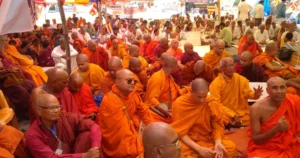UPSC Relevance
GS-1: Indian Culture – Buddhist Heritage
GS-2: Governance – Religious Freedom, Minority Rights, State’s Role in Temple Management
GS-4: Ethics – Balancing Rights and Duties, Religious Coexistence

Key Highlights
Context
- The Mahabodhi Temple in Bodh Gaya, Bihar, marks the site of Gautama Buddha’s enlightenment.
- A UNESCO World Heritage Site since 2002, it is governed by the Bodh Gaya Temple Management Committee (BTMC) under the Bodh Gaya Temple Act, 1949.
- The BTMC includes four Buddhists, four Hindus, and a Hindu District Magistrate as ex-officio chair.
Protest Details
- Since February 12, 2024, approximately 300 monks have protested.
- They demand full Buddhist control of the temple and repeal of the 1949 Act.
- The All-India Bhikkhu Federation (AIBF) calls the law outdated and discriminatory.
Key Issues
- Monks argue the BTMC lacks sufficient Buddhist representation, alleging Hindu dominance over a Buddhist site.
- The Act’s mandate for a Hindu chairman is seen as infringing on Buddhist autonomy.
- A 2012 Supreme Court petition by monks seeks the Act’s repeal.
Historical and Political Context
- Enacted in 1949, the Act stirred controversy in the 1960s when a Muslim IAS officer chaired the BTMC.
- Protests occurred in West Bengal in 2015, led by AIBF.
- The issue has resurfaced in Parliament, notably during Waqf Amendment Bill 2025 discussions.
Governance Challenges
- The BTMC faces accusations of financial opacity, with a ₹880 lakh fine in 2023 for FCRA violations.
- Foreign donations are scrutinized under FCRA 2010.
- Internal divisions among Buddhists complicate unified demands.
Significance
- Raises questions about religious rights, secularism, and minority autonomy.
- Mirrors debate on state involvement in religious sites (e.g., Sabarimala, Waqf boards, Church governance).
- Highlights tensions between religion, identity, and governance in India.
Analysis & Way Forward
- Reassessing colonial and post-independence temple laws is crucial to align with constitutional religious freedom guarantees (Articles 25-28).
- A more inclusive governance model for multi-faith sacred sites is needed.
- Dialogue among Buddhist monks, civil society, and authorities should be prioritized.
- The Supreme Court must clarify the legality of religious representation in sacred site management.




